The Rules. Book 1; The End Read online
Page 7
Finally, on top of the trunk itself, there was mum’s medieval gown, carefully wrapped in multiple layers of tissue. (Her mum had clearly regretted moving this dress up into the loft most of all.) Even through these layers, it glowed like a hoard of jewels; emeralds, rubies, sapphires, pearls, amber, gold.
Across the top of the dress, Beth’s mum had almost reverently laid the full size, replica sword that had once graced the living room wall.
The fake jewels in its handle sparkled in the bulb’s sharp light.
She recognised it, of course.
Yes, it was the sword her mum had bought years ago as a decoration. But it was also an exact copy of the sword she had found deeply embedded in the stone below Silbury Hill.
How could that be?
Because, of course, as the archaeologists had claimed, it was all a silly joke.
It had been put together by pranksters, who had obviously purchased a sword similar to mum’s.
Instinctively, Beth gripped it by its handle.
She knew it was heavier than it looked, and almost impossible to lift smoothly in this way except by someone who was ridiculously strong.
She flexed her muscles, preparing them for the weight.
She lifted the sword up as if it were almost weightless. As if her arm were rippling with the muscles more usually found in superhero comic books.
Beth gasped.
The blade, shedding its patina of dust, flashed in the bared light. It glowed brighter than the hanging bulb.
Rays of light glanced off it, shooting across and around the room as Beth twirled it in her hand.
It wasn’t even remotely heavy!
It felt like she was holding nothing heavier than a pen in her hand!
Had it always been like this?
Had Beth simply presumed it was heavy because it appeared to be made of solid metal?
Or had it rusted away inside, leaving nothing more than a weakened shell?
Her eyes fell on the trunk.
She remembered the real reason why she was here.
To see what was in this trunk.
*
Beth carelessly cast the sword aside.
She started in surprise as it clanged heavily across the bared floorboards.
No matter; the trunk!
The contents of the trunk were the main thing!
She pulled the wrapped dress aside with great care, placing it on top of the nearby books on Merlin.
She took out the key. She slipped it inside the trunk’s lock.
It turned with only a minimum of effort.
Doubtlessly, the lock was still saturated in the thick oil her dad had said he had used to get it working again.
The lid remained closed.
Beth tried to push it up.
She tried to find a gap that she could prise her fingers into and pull it up.
Nothing moved.
Beth sat back on her heels, sighing in frustration.
She stared hard at the trunk.
Was it constructed like a Chinese puzzle, where blocks of interlocking wood had to be moved in a certain order?
She searched with her fingers for any slight indents in the trunk’s sides, seeking out anything that could signify the presence of interlocking segments.
Nothing.
She moved slowly around the trunk on her hands and knees.
She slowly looked over every inch of it, dusting away any dirt or cobwebs that obscured her view.
Crouching behind it, she noticed that it hardly looked any different from this side than when you looked at it from the front, apart from the centred lock.
Like a laptop computer, she thought.
On a laptop computer, there’s only some small difference, such as a manufacturer’s logo, that lets you know if you’ve got it facing you the right way or not.
And some makes, for some strange reason, position that logo so that it’s the right way up when the lid is opened, but the wrong way round when you’re preparing to open it.
Put it on your desk the wrong way round and you could spend ages trying to open it, thinking there’s some locking mechanism you haven’t tripped yet.
She reached out towards the lid and pushed up on it.
With the pained shrieks of rusted hinges, it began to slowly rise.
*
More books on Merlin.
More books on Morgan le Fay.
Books, too, on the Lady of the Lake.
Old books, far older and in far worse condition than the ones Beth’s mum had piled up on the outside of the trunk.
There were incredibly old Tarot packs, incense sticks that crumbled to the touch, pictures that were browned and frayed with age.
There was another gown too, perhaps even more beautiful than her mum’s.
It had also been tenderly wrapped in layers of tissue paper.
Beth could make out the swirling, pearl-studded embroidery, the sparklingly bright colours of a cathedral’s stained glass.
She moved this dress aside as carefully as she had her mum’s.
Next, she moved the books, making sure she kept them apart from those brought up here by her mum.
The layer beneath was a compete disappointment.
It was nothing more than a confused, untidy mass of notebooks in a variety of faded colours.
They were the sort of paper-backed notebooks you would find making up the bulk of any child’s schoolwork.
Beth irritably shuffled through them, revealing other, older notebooks beneath.
It could have been a trunk used by generations of proud parents to store schoolwork going back well over a hundred years.
Beth picked up one of the notebooks, one with a dulled yellow cover and lined pages inside.
It was full of either hastily or carelessly written notes that completely ignored the lines.
The notes bent around corners, or stretched across the page vertically.
The writing wasn’t easy to read, either.
Sometimes it was little more than a hurried scrawl.
Yet Beth recognised odd words purely because they were so familiar to her; Merlin, Arthur, magic, knights.
There hardly seemed to be a sentence that didn’t end in at least one large question mark.
Why would anyone have bothered writing all this down?
She checked the older notebooks, but they were all full of the same thing; endless, unanswered questions.
Questions that seemed to assume Arthur and his knights were historical figures rather than characters taken from legends.
Many had been crudely illustrated with inept sketches of maidens, wizards, witches and knights.
There were also diagrams, patterns and symbols.
In the even older journals, bound in leather that disintegrated and shredded in Beth’s hands, passages had been crossed out. Some had been commented on in another hand, and in a different, sharper ink.
The comments themselves had been commented on, or even angrily scrawled out.
The older, more faded script lying beneath it all was usually almost impossible to decipher. From what Beth could make out, it wasn’t the English she knew, but a politer, more considered form.
She flicked through the notes, wondering why mum or gran would want to keep such worthless meanderings under lock and key.
Then, suddenly, she almost swallowed her tongue in surprise.
She almost feverishly turned back the pages, trying to find it again.
Where was it?
What was it?
Was it what she thought she had seen?
She was sure she hadn’t imagined it!
As the pages had flipped swiftly, uncontrollably, though her fingers, she had glimpsed something she thought she had recognised.
She was
hoping she could find it again.
She was also hoping she was wrong, and she hadn’t really seen it at all.
But there, yes!
There it was!
The eye.
The Eye of God stared back at her from the page.
*
Chapter 18
Frantically, Beth reached out for and picked up the books she had already quickly scanned through.
She flicked through the uppermost one, this time looking for the eye.
Yes, there it was!
And, as the pages flicked by, she saw it again and again.
How could she have missed it?
Because she hadn’t been looking for it.
Because she hadn’t expected it to be here.
*
Beth picked up another book.
She urgently flicked through it.
She stopped and stared as the eye symbol came up again and again and again.
And there, again, in another book. And again. And again.
And there again and again in another book.
And another book, and another.
In every book.
The eye stared out at her from the pages of every book she picked up and flicked through.
It featured time and time again, surrounded by notes, by comments.
And by question mark after question mark.
‘What does it mean?’
‘Why do I dream of this eye?’
‘Eyes!’ someone else had written. ‘There are two versions, only subtly different. One lies in a triangle, the other on a pyramid.’
Beth had seen the eyes many times in her own dreams, of course.
But she had naturally put this down to the unforgettable consequences of Donna’s flipped coin, as well as the eyes suddenly appearing everywhere as graffiti; etched into the dirt on truck and bus sides, sprayed in vibrant colours alongside train carriages and buildings, plastered over hoardings and posters.
Within the books, alongside other sketches of the symbols, some of the writers had made attempts at researching the possible meanings that lay behind them.
There were numerous mentions of the Eye of Horus, here sometimes referred to as ‘the sun god’, here ‘the sky god’.
‘The all seeing eye’ someone had scribbled, to which another had added, ‘No one can escape his magical reach.’
A strangely pristine American dollar bill had been glued onto one page.
Beth recognised it from photographs of dollar bills she had seen in newspaper articles drawing attention to the pyramid and the glowing eye surmounting it.
‘What can this mean?’ a nervous hand had scrawled on the opposite page. ‘James returned from his trip to America (March 1934) with one of their new notes.’
The eye in the triangle featured less than the eye in the pyramid.
When Beth realised this, she couldn’t help but recall the way the coin had landed that way up so many more times too, although she felt sure there couldn’t be any connection.
Comments such as ‘Triangle = Trinity?’ appeared regularly. As did ‘He watches over all things’ and ‘The eyes of the Lord are in every place. Proverbs 15:3.’
In the later books (but not, curiously, the earlier ones) it was often accompanied with a title, either written weirdly large or inked again and again to make the letters more solid.
It was as if each writer hoped that making it more prominent somehow also made it more true. ‘Omniscience of God’, it most frequently said. Or, as a variant, ‘God’s omnipresence’.
It was while searching for the eye symbols she had missed earlier that Beth began to notice another constantly reoccurring theme, a passage that was repeated in every notebook.
‘Fearing that the war against demons, sprites and fays was being lost, Merlin brought the time of magic to an end, imprisoning both good and bad in a most enduring substance, to be withheld therein for over a thousand years.
Gesta Britanniæ, Maidulph of Malmesbury, c680’
Urgently scribbled notes always surrounded this passage. Lines linked individual words with comments, comments that were crossed out, corrected, then sometimes corrected once again.
Someone had discovered that Maidulph was ‘Irish, founder of Malmesbury Abbey.’
A confused query – ‘But wasn’t it Merlin who was trapped in stone/crystal?’ – was confirmed by the confident, red-inked declaration, ‘Yes, by the Lady of the Lake, Vivian!’
‘Vivian’, however, had been crossed out and replaced by ‘Nimue’.
Beth could understand the confusion.
As her gran had once explained, the Lady of the Lake had many names. There were a number of conflicting stories, with each one trying to make sense of earlier legends.
In some tales, Morgan le Fay was the wicked sorceress who tricked Merlin into revealing his secrets, only to later entrap him in a cave.
‘Merlin traps both “good and bad”; does that mean himself?’ someone had written, adding, ‘Perhaps the later romances were trying to make sense of this, and eventually only he was the one trapped?’
The writer seemed doubtful about her own interpretation, following it with a line of large question marks.
‘Beth?’
Beth leapt to her feet, causing the lid to slam shut.
Her mum was standing at the top of the loft’s steps, glaring at her accusingly.
*
Chapter 19
Far from being angry with Beth, her mum crouched down alongside her on the floor.
She even helped her open the trunk once more.
‘Well, you were going to have all these things one day anyway, love; so now’s probably a better time than any. Does any of it make sense to you?’
Beth shook her head. ‘I know something weird is going on mum; but these notebooks just add to that feeling of weirdness!’
Her mum chuckled.
‘Well, that seems to have been our lot, doesn’t it love? You, me, my mum, your great-gran and every other woman in our family before us. I used to think it was just me, just me going crazy, until your gran had your dad bring this trunk round and I started sorting through it. It was a relief, really; to see that, just like me, they’d all had this weird urge to start writing things down. Things about their dreams, about Arthur and Merlin.’
‘And the symbols mum; the eye in the triangle. You never mentioned you’d had dreams about them. I mean, when all that about the coin came up in the court case.’
Beth’s mum hung her head sadly,
‘Yes, yes, I’m sorry love. But the first thing I heard about the symbols was when I heard about the coin in court. I mean, I was shocked, really shocked; but it made no sense, no sense to me at all! And what was I supposed to say, love? That I’d dreamt about these symbols? These were symbols that always appeared in my dreams? They’d think that I was – well, you know.’
‘Crazy? They’d think you were crazy, yeah? But why didn’t you mention this after the court case mum? Why didn’t you tell me then that you’d dreamt of them?’
‘Because I’d noticed that you didn’t seem to recognise the symbols; which meant you weren’t dreaming about them. And I wanted it to stay that way. I didn’t want you dreaming about them.’
‘So, did you – did anyone – ever work out what the symbols mean? Is everything we’ve been reading in the papers right? That one’s the Eye of God, the other the Eye of Horus, the Sun God?’
Beth’s mum frowned worriedly.
‘I�
�d always felt that, even though the symbols were similar, that one was good and the other evil; though I never found out if that was true or not.’
She nodded towards the journals in the trunk.
‘And neither did anyone writing in these books either, from what I can tell. But I did find somewhere that – let me see, which book was it?’
She began quickly sorting through the notebooks in the trunk, focusing on the more modern, pastel-coloured ones.
She grinned as she excitedly grabbed a mauve covered book.
‘Ah, yes, this one I think! One of my later books; one I was using to bring together most of what I’d written before.’
She opened it up on the first page.
‘Hah, yes! See! “The Enlightened One with the Torches of Illumination.”’
‘Which means?’
‘Ah, as it says here, love, see? “The Eye is Luciferian Sun worship!”’
She proudly handed the opened notebook to Beth so she could read the rest herself.
‘Winter solstice; the Sun (Horus, the Light Of the World) dies. Reaches lowest point in sky; for 3 days. Rises again 25 Dec (Risen Saviour?) Passover/Easter; sun crosses Equator.’
Beth looked up from the book, looked at her mum curiously.
‘Mum, all this; December twenty-fifth? Easter? Aren’t we really talking about Christ here mum?’
Her mum shrugged.
‘I did say I never really understood it love. This was just something I found out. I don’t know what it could mean.’
Beth flicked though the rest of the book. All the other pages had been left blank. That’s probably why she had missed this book before; she had put it aside, believing it to be empty.
Seeing the look of disappointment on Beth’s face, her mum said defensively, ‘Well, I did say I didn’t find out much love.’
‘But this Horus, mum; he’s just from some old Egyptian legends, isn’t he? He didn’t really exist – did he?’
Her mum laughed.
‘Course he never really lived, silly! I read all the legends, the stories about him; I just got more confused than ever! All these different mothers, different wives! Sometimes his wife was his mother, or his sister! So no, I don’t think he’s a real person love!’
‘So…’ Beth paused thoughtfully. ‘So, he’s like Merlin; someone from legend, right?’
Her mum nodded.
Beth indicated the trunk’s contents with a nod of her own head.
‘Yet here we have, mum, our entire family, going back hundreds of years. Writing all sorts about both of these people who supposedly never lived; Horus and Merlin.’
Under Beth’s quizzical, reproving stare, her mum momentarily felt and looked embarrassed.
To lift the mood, she said light-heartedly, ‘And getting into trouble doing it too!’
‘Trouble?’
‘Oh yes! Paper wasn’t cheap way back then, like it is now love. Only the rich could afford it. So, your gran reckons, they must have stolen those expensive looking books bound in leather. That’s why there’s so little space left in there. Every inch of paper was special. But look at this; this was even worse!’

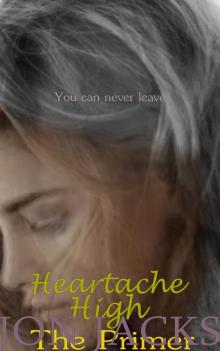 Heartache High: The Primer
Heartache High: The Primer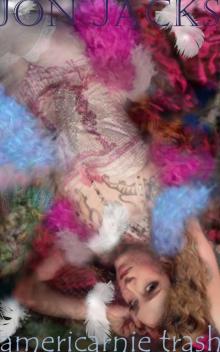 Americarnie Trash
Americarnie Trash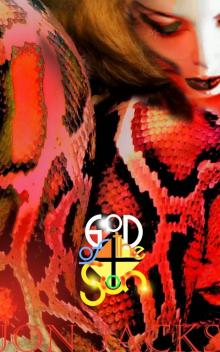 God of the 4th Sun
God of the 4th Sun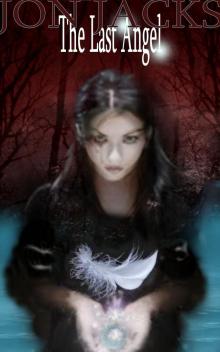 The Last Angel
The Last Angel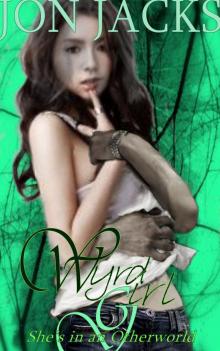 Wyrd Girl
Wyrd Girl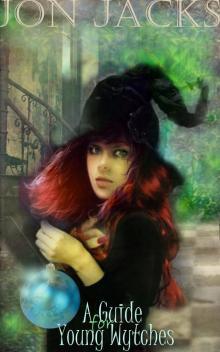 A Guide for Young Wytches
A Guide for Young Wytches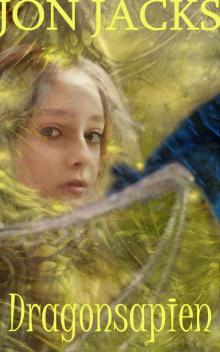 Dragonsapien
Dragonsapien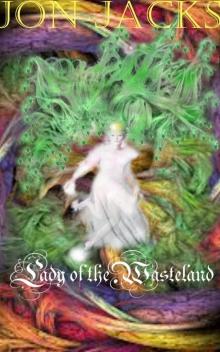 Lady of the Wasteland
Lady of the Wasteland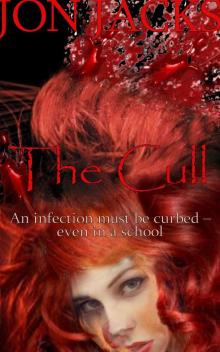 The Cull
The Cull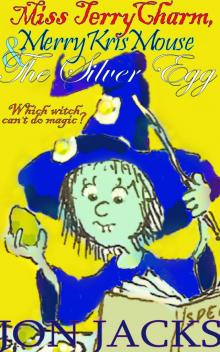 Miss Terry Charm, Merry Kris Mouse & The Silver Egg
Miss Terry Charm, Merry Kris Mouse & The Silver Egg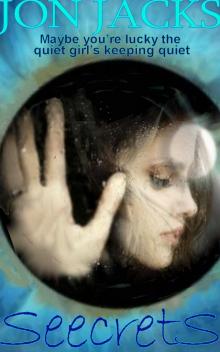 Seecrets
Seecrets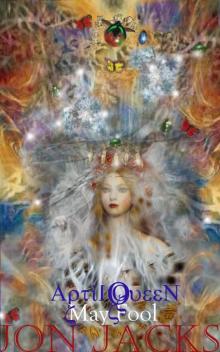 April Queen, May Fool
April Queen, May Fool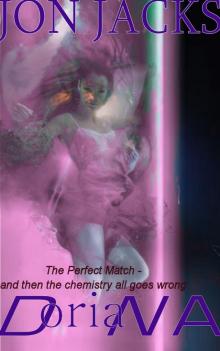 DoriaN A
DoriaN A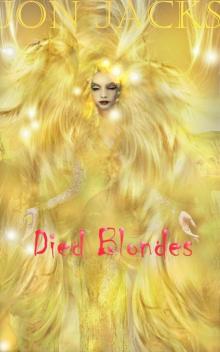 Died Blondes
Died Blondes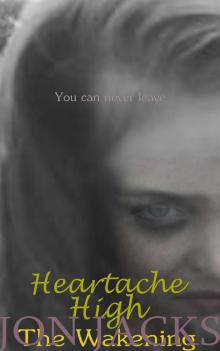 Heartache High: The Wakening
Heartache High: The Wakening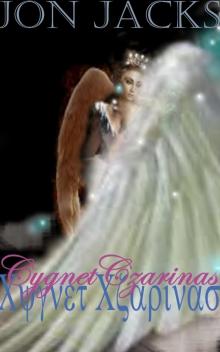 Cygnet Czarinas
Cygnet Czarinas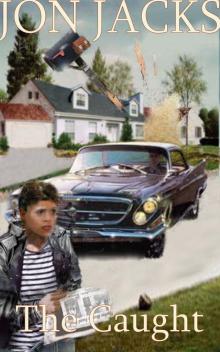 The Caught
The Caught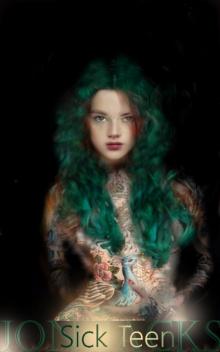 Sick Teen
Sick Teen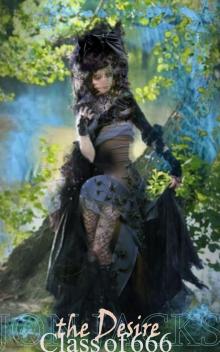 The Desire: Class of 666
The Desire: Class of 666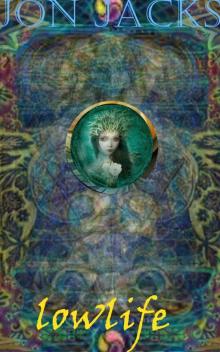 Lowlife
Lowlife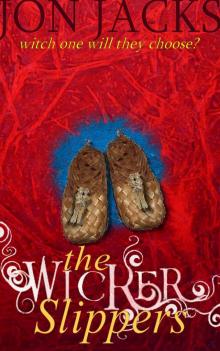 The Wicker Slippers
The Wicker Slippers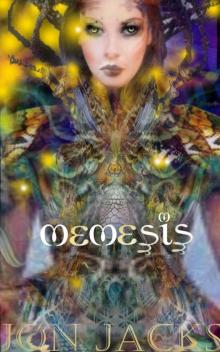 Memesis
Memesis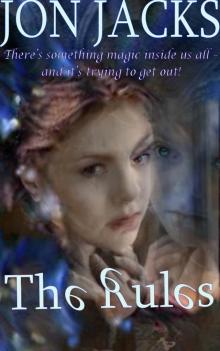 The Rules. Book 1; The End
The Rules. Book 1; The End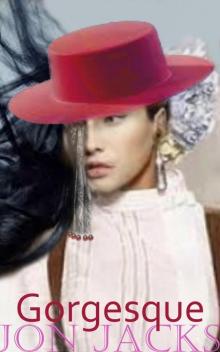 Gorgesque
Gorgesque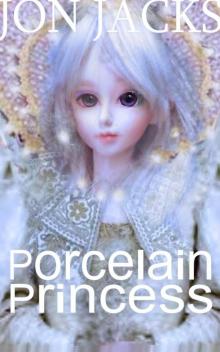 Porcelain Princess
Porcelain Princess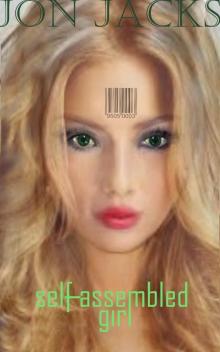 Self-Assembled Girl
Self-Assembled Girl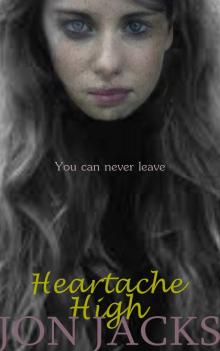 Heartache High
Heartache High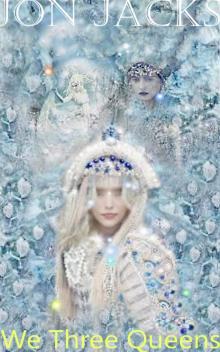 We Three Queens
We Three Queens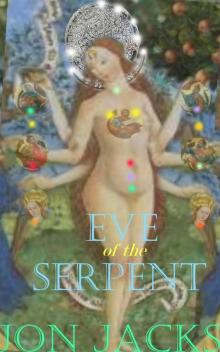 Eve of the Serpent
Eve of the Serpent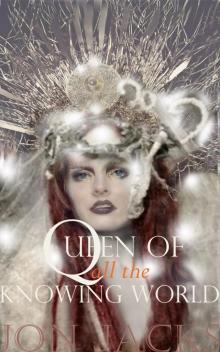 Queen of all the Knowing World
Queen of all the Knowing World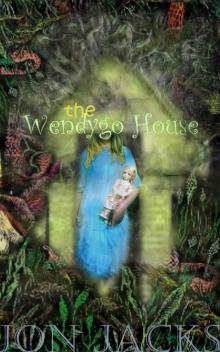 The Wendygo House
The Wendygo House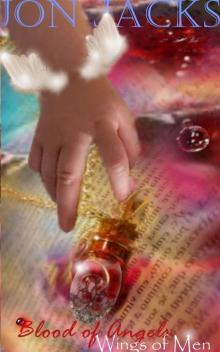 Blood of Angels, Wings of Men
Blood of Angels, Wings of Men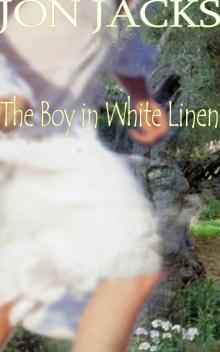 The Boy In White Linen
The Boy In White Linen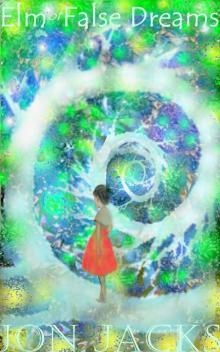 Elm of False Dreams
Elm of False Dreams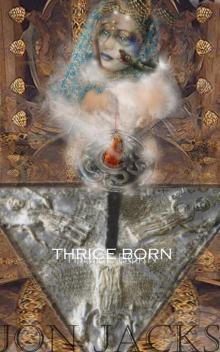 Thrice Born
Thrice Born